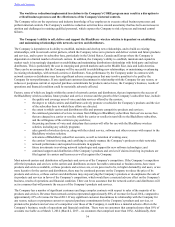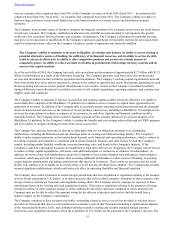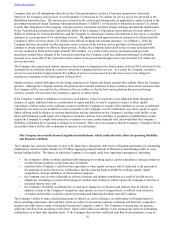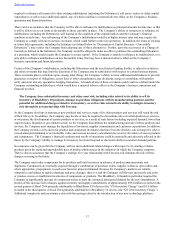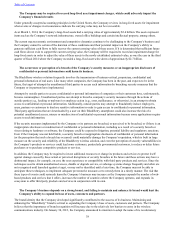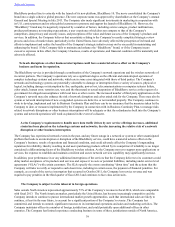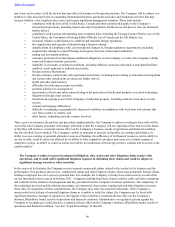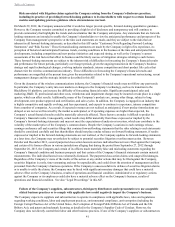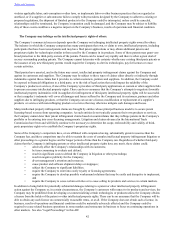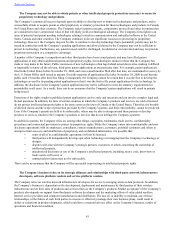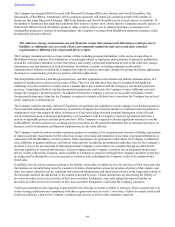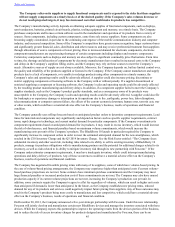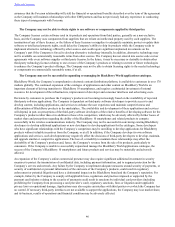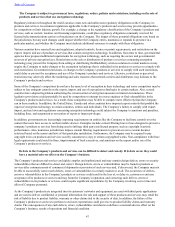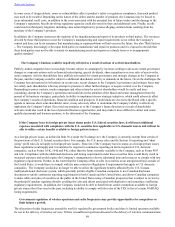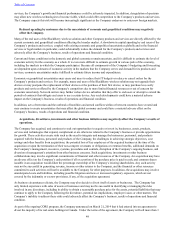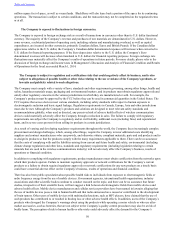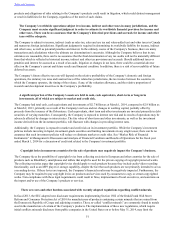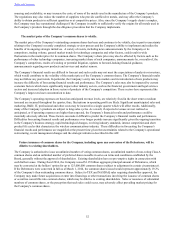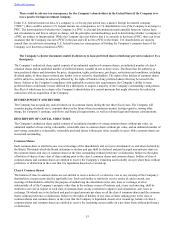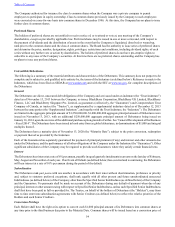Blackberry 2014 Annual Report Download - page 52
Download and view the complete annual report
Please find page 52 of the 2014 Blackberry annual report below. You can navigate through the pages in the report by either clicking on the pages listed below, or by using the keyword search tool below to find specific information within the annual report.
44
The Company has designed BES to be used with Microsoft Exchange, IBM Lotus Domino and Novell GroupWise. The
functionality of BlackBerry smartphones sold to corporate customers will depend on continued growth in the number of
businesses that adopt Microsoft Exchange, IBM Lotus Domino and Novell GroupWise as their email and server solutions. If
the number of businesses that adopt these platforms fails to grow or grows more slowly than the Company currently expects, or
if Microsoft, IBM or Novell discontinue products, delay or fail to release new or enhanced products, or announce new
incompatible products or versions of existing products, the Company’s revenues from BlackBerry enterprise customers could
be materially adversely affected.
The collection, storage, transmission, use and disclosure of user data and personal information could give rise to
liabilities or additional costs as a result of laws, governmental regulations and carrier and other customer
requirements or differing views of personal privacy rights.
The Company transmits and stores a large volume of data, including personal information, in the course of supporting its
BlackBerry wireless solution. This information is increasingly subject to legislation and regulations in numerous jurisdictions
around the world that is intended to protect the privacy and security of personal information as well as the collection, storage,
transmission, use and disclosure of such information. In addition, a number of leading companies in the mobile
communications industry, including the Company, have agreed to privacy principles designed to prompt third-party application
developers to conspicuously post privacy policies with their applications.
The interpretation of privacy and data protection laws, and their application to the Internet and mobile communications, in a
number of jurisdictions is unclear and in a state of flux. There is a risk that these laws may be interpreted and applied in
conflicting ways from country to country and in a manner that is not consistent with the Company’s current data protection
practices. Complying with these varying international requirements could cause the Company to incur additional costs and
change the Company’s business practices. In addition, because the Company’s services are accessible worldwide, certain
foreign jurisdictions may claim that the Company is required to comply with their laws, even where the Company has no local
entity, employees, or infrastructure.
The Company could be adversely affected if legislation or regulations are expanded to require changes in its business practices,
if governmental authorities in the jurisdictions in which the Company does business interpret or implement their legislation or
regulations in ways that negatively affect its business or if end users allege that their personal information is not collected,
stored, transmitted, used or disclosed appropriately or in accordance with the Company’s end user agreements and privacy
policies or applicable privacy and data protection laws. If the Company is required to allocate significant resources to modify
its BlackBerry wireless solution or its existing security procedures for the personal information that its transmits and stores, its
business, results of operations and financial condition may be adversely affected.
The Company’s network carriers or other customers, partners or members of its ecosystem may also have differing expectations
or impose particular requirements for the collection, storage, processing and transmittal of user data or personal information in
connection with the BlackBerry wireless solution. Such expectations or requirements could subject the Company to additional
costs, liabilities or negative publicity, and limit its future growth. In addition, governmental authorities may use the Company’s
products to access the personal data of individuals without Company’s involvement, for example, through so-called lawful
intercept capability of network infrastructure. Even perceptions that the Company’s products do not adequately protect users’
privacy or data collected by Company, made available to Company or stored in or through the Company’s products or that they
are being used by third parties to access personal or consumer data could impair the Company’s sales or its reputation and
brand value.
In addition, laws in various countries relating to the liability of providers of online services for activities of their users and other
third parties are currently being tested by a number of claims, which include actions for invasion of privacy, libel, slander, and
other tort claims, unlawful activity, copyright and trademark infringement, and other theories based on the nature and content of
the materials searched, the ads posted, or the content generated by users. Certain jurisdictions are also testing the liability of
providers of online services for activities of their users and other third parties. Any court ruling that imposes liability on
providers of online services for activities of their users and other third parties could harm the Company’s business.
Certain governments are also imposing requirements for the filtering of content available to end users. These requirements vary
across varying jurisdictions and compliance with these requirements may be costly. Conversely, a failure to comply could result
in adverse publicity, a ban on the Company’s products and services as well as other regulatory sanctions.
Table of Contents


